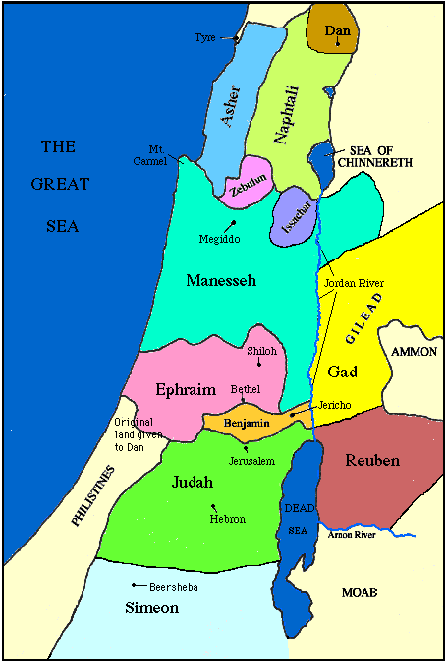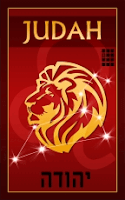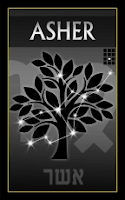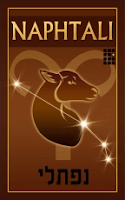The Tribes of Israel are the traditional divisions of the ancient Jewish people. Biblical tradition holds that the twelve tribes of Israel are descended from the sons and grandsons of the Jewish forefather and are called “Israel” from Jacob’s name given to him by .
The twelve tribes are as follows: , , , , , , , , , , and .
The story of the twelve tribes begins when and his family went down to as “70 souls” In “the Israelites were fertile and prolific; they multiplied and increased very greatly,” and there they became the “Israelite people.” Following the death of - one of Jacob’s sons who had become viceroy of Egypt oppressed the Israelites by placing upon them burdensome labor.
Map of the Twelve Tribes  Click on any tribe for more information |
God “remembered with , with , and with ,” made Himself known to and rescued the Israelites from Egypt. By this time the nation numbered “600,000 men on foot” which is usually understood to be military-aged men excluding women and children.
At , the Israelite nation is given its laws and regulations - the - and affirms their covenant with God. After wandering for 40 years in the desert under the leadership of , the twelve tribes enter the land of with in command.
After conquering the land, each tribe was allotted an individual territory to settle. During this period of settlement, and the subsequent period of the , there was no predetermined pattern of leadership among the tribes though various crises forced the tribes into cooperative action against enemies.
served as a sacral center for all the tribes, housing the under the priestly family of Eli. Under the impact of military pressures, the Israelites felt compelled to turn to with the request that he establish a monarchy, and Saul was crowned to rule over all the tribes of Israel.
Upon his death, Saul’s son was accepted by all the tribes as the new king, save and who preferred . David’s struggle with the house of Saul ended in victory for him and all the elders turned to David for royal leadership. He ruled from and later over all the tribes of Israel and following his death was succeeded by his son, . After the death of , the tribes once again split along territorial and political lines, with and in the south loyal to the Davidic house and the rest of the tribes in the north ruled by a succession of dynasties.
Modern scholarship does not generally accept the biblical notion that the twelve tribes are simply divisions of a larger unit which developed naturally from patriarchal roots. This simplistic scheme, it is felt, stems from later genealogical speculations which attempted to explain the history of the tribes in terms of familial relationships. The alliance of the twelve tribes is believed to have grown from the organization of independent tribes, or groups of tribes, forced together for historical reasons. Scholars differ as to when this union of twelve took place and when the tribes of Israel became one nation.
One school of thought holds that the confederation took place inside the country toward the end of the period of the Judges and the beginnings of the Monarchy. All of the traditions which see the twelve tribes as one nation as early as the or the wanderings in the desert are regarded as having no basis in fact. This school recognizes in the names of some of the tribes the names of ancient sites in Canaan, such as the mountains of , , and , the desert of , and . With the passage of time, those who dwelt in these areas assumed the names of the localities.
Others feel that the tribes descended from the matriarch - namely , , , , and - existed at an earlier stage as a confederation of six tribes whose boundaries in Canaan were contiguous. Only at a later stage did other tribes penetrate the area, eventually expanding the confederation to twelve.
A second school grants that the union of twelve existed during the period of wanderings in the desert, but that Canaan was not conquered by an alliance of these at any one time. Rather, there were individual incursions into the land at widely separated periods. However, the covenant among the twelve tribes and their awareness of national unity flowing from ethnic kinship and common history, faith, and sacral practices had their source in the period prior to the conquest of the land.
The number twelve is neither fictitious nor the result of an actual genealogical development in patriarchal history. It is an institutionalized and conventionalized figure which is found among other tribes as well, such as the sons of , of Nahor, of , and . Similar organizational patterns built about groups of twelve, or even six, tribes, are known from Asia Minor, and . In , such groupings were called amphictyony, meaning “to dwell about” a central sanctuary. Each tribe was assigned a prearranged turn in the provision and maintenance of the shrine. The amphictyonic members would make pilgrimages to the common religious center on festive occasions. The exact measure of correspondence between the amphictyony of the Hellenic world and the duodecimal structure of the tribes of Israel may be the subject of scholarly controversy, but there can be little doubt that this pattern of twelve attributed to the Hebrew tribes is very real and historically rooted. Thus, if one tribe were to withdraw from the union or to be absorbed into another, the number twelve would be preserved, either by splitting one of the remaining tribes into two or by accepting a new tribe into the union. For example, when the tribe of is considered among the twelve tribes, the Joseph tribes are counted as one. However, when is not mentioned, the Joseph tribes are counted separately as and . For the same duodecimal considerations, is counted as a tribe even after having been absorbed into , and even after having split in two, is considered one.
The confederation of the twelve tribes was primarily religious, based upon belief in the one “God of Israel” with whom the tribes had made a covenant and whom they worshiped at a common sacral center as the “people of the Lord.” The Tent of Meeting and the were the most sacred objects of the tribal union and biblical tradition shows that many places served as religious centers in various periods. During the desert wanderings, “the mountain of God,” that is, Sinai or Horeb, served as such a place, as did the great oasis at where the tribes remained for some time and from where the tribes attempted a conquest of the land. Many sites in Canaan are mentioned as having sacred associations or as being centers of pilgrimage. Some of these, such as , where received the name Israel, , where the rested, and , go back to patriarchal times. built an altar at and the tribes gathered there “before the Lord” and made a covenant with Him in Joshua’s time. enjoyed special importance as a central site for the tribes. There they gathered under to divide up the land by lot, and it was there that they placed the Tent of Meeting and the . Eli’s family, which traced its descent from , the high priest, served at Shiloh, and it was to that the Israelites turned for festivals and sacrifices.
The multiplicity of cultic places raises the question of whether all twelve tribes were centered about one amphictyonic site. It may be that as a tribe’s connections with the amphictyony were weakened for various reasons, the tribe began to worship at one or another of the sites. Possibly, different sites served the several subgroups among the tribes. and , for example, served the southern groups of tribes; , , and were revered by the tribes in the center of the country; and the shrine at Dan served the northern tribes. The likelihood of a multiplicity of shrines is strengthened by the fact that clusters of Canaanite settlements separated the southern and central tribes and divided the central tribes from those in . It is possible that various shrines served different tribes simultaneously, while the sanctuary which held the Ark of the Lord was revered as central to all twelve.
The changes which occurred in the structure of the twelve tribes and in their relative strengths, find expression in the biblical genealogies. The tribes are descended from four matriarchs, eight of them from the wives and , and four from the handmaids and . It is a widely held view that attribution to the two wives is indicative of an early stage of tribal organization, the “tribes of Leah” and the “tribes of Rachel.” The attribution of four tribes to handmaids may indicate either a lowered status or late entry into the confederation. In the list of the twelve tribes, is prominent as the firstborn, followed by , , and , the sons of , who occupy primary positions.
stood at the head of a tribal league and had a position of central importance among his confederates prior to the conquest of the land. On the other hand, the same tribe is inactive during the period of the Judges - it did not provide any of the judges and during war against , “sat among the sheepfolds” and did not render any aid. Possibly, because this tribe dwelt on the fringes of the land, its links with the others were weakened and its continued existence as one of the tribes of Israel was in jeopardy.
was absorbed by . spread throughout Israel as a result of its sacral duties. was cut off from the rest of the tribes by a Canaanite land strip that separated the mountains of Judah and Ephraim. Reuben’s place as head of the twelve tribes was taken by the house of Joseph which played a decisive and historic role during the periods of the settlement and the Judges. came from the tribe of . Shechem and Shiloh were within the borders of the house of Joseph. Samuel came from the hill country of Ephraim. Ephraim led the tribes in the war against Benjamin over the incident of the concubine in Gibeah. At the beginning of the Monarchy, the leadership passed to Judah. The passage in illustrates well how the dominant position among the tribes passed from Reuben to Ephraim and from Ephraim to Judah.
Each of the twelve tribes enjoyed a good deal of autonomy, ordering its own affairs after the patriarchal-tribal pattern. No doubt there were administrative institutions common to all the tribes, situated beside the central shrines, though information about them is exceedingly scanty. During the desert wanderings, leadership of the people was vested in the princes of each of the tribes and the elders who assisted . They met and legislated for the entire people. There are references to meetings of tribal leaders and elders during the periods of the settlement and the Judges. “The princes of the congregation, the heads of the thousands of Israel” along with Phinehas the priest, conducted negotiations with the Transjordanian tribes, in the name of the entire nation. Joshua summoned “the elders, the heads, the judges, and the officers of Israel” to make a covenant in Shechem. The elders of Israel, speaking for the entire nation, requested Samuel to appoint a king. The incidents of the concubine in Gibeah and Saul’s battle with Nahash the Ammonite are classic examples of joint action taken by the league of twelve tribes acting “as one man, from Dan even to Beer-Sheba, with the land of Gilead.” In the one case, unified action was taken by the tribes against one of their members, Benjamin, for a breach of the terms of the covenant. The war against Nahash the Ammonite proves that the tribes were required to come to the aid of any one of the league that found itself in difficulty. Because of the sacral nature of the league, the wars of the tribes were considered “wars of the Lord.” Nevertheless, the narratives in the Book of Judges regarding the battles which Israel waged against its enemies make it clear that the league must have been rather weak in those days.
The consciousness of national and religious unity had not yet led to a solid politico-military confederation. The Song of Deborah gives clear expression to the lack of solidarity among the tribes, for some of them did not come to the aid of the Galilean tribes. It is impossible to designate even one war against external enemies during the period of the Judges in which all the tribes acted in concert. Indeed, there are indications of intertribal quarrels and disputes. In this connection, there are scholars who hold that the judge-deliverers were not pan-tribal national leaders, but headed only individual tribes, or groups of them. It was only toward the end of the period of the Judges when the Philistine pressure on the Israelite tribes increased in the west and that of the Transjordanian peoples in the east, that the religio-national tribal confederation assumed political and military dimensions. The Israelite tribes then consolidated as a crystallized national-territorial entity within the framework of a monarchical regime. David, Solomon, and afterward the kings of Israel and Judah tended to weaken tribal consciousness in favor of the territorial and monarchical organization. It is apparent, however, from Ezekiel’s eschatological vision that the awareness of Israel as a people composed of twelve tribes had not, even then, become effaced.
- Reuben.
- Simeon.
- Levi.
- Judah.
- Zebulun.
- Issachar.
- Dan.
- Gad.
- Asher.
- Naphtali.
- Joseph.
- Benjamin.
Note: Sometimes the tribe of Joseph is listed as two tribes for his sons, Ephraim and Manasseh. When the Bible lists the tribes this way, it sometimes removes the priestly tribe of Levi, since it didn’t receive a territorial inheritance.
Let’s look at what the Bible tells us about the history and the future of the 12 tribes of Israel.
God’s promise to Abraham, Isaac and Jacob
God promised Abraham that his descendants would be numerous (Genesis 13:16; 17:2; 22:17) and would eventually become “many nations” (Genesis 17:4-5). He also promised Abraham that his descendants would “possess the gate of their enemies” (Genesis 22:17) and be “blessed” mightily by God (verses 16-18).
God also said that his descendants would be identified throughout history by the name of Abraham’s son, “Isaac” (Genesis 21:12). The blessings given to Abraham and Isaac were called the “birthright” blessings because they were passed on to successive generations as a right of their birth.
The “birthright” blessings given to Abraham were passed on to Isaac, who married Rebekah. Millions of people would descend from Isaac and Rebekah over time. In fact, they would eventually number in the billions throughout the generations of humanity on the earth.
The blessing of numerous descendants who would possess the gates of their enemies was a continuation of the blessing God had promised Abraham that He would fulfill in Isaac (Genesis 17:17-19, 21). However, Abraham had a previous son, Ishmael, by Hagar, and Ishmael’s descendants were also prophesied to become numerous and constitute a “great nation” that would feature “twelve princes” (verse 20).
The “great nation” of Ishmael’s descendants today is the Arab world, the people who make up most of the nations in the modern Middle East. The Arabs know that they are descended from Ishmael, the son of Abraham and Hagar.
If the descendants of Ishmael are the Arabs, then which nations today descended from Isaac? If the Bible is true, Isaac’s descendants should be nations more numerous, prosperous and powerful than the Arabs. The Bible is God’s truth (John 17:17)! Obviously, Isaac’s descendants in the modern world must consist of far more than just the Jews—since the Jews are vastly outnumbered by the Arabs today. Genesis 24:60 prophesied that Isaac’s descendants would number in the multiple millions over time.
Isaac passed his “birthright” blessings on to his son, Jacob, even though the oldest son, Esau, would normally have received them. Genesis 25:30-34 informs us that Esau “sold” his birthright to Jacob for some red stew. Then when their father, Isaac, officially passed on the birthright, Jacob deceived his father into believing he was his brother. In essence, Jacob “stole” the birthright through deception (Genesis 27).
One of the blessings Jacob received from Isaac was that other nations would bow down to the nations that would descend from Jacob (Genesis 27:29). Clearly, for this prophecy to be fulfilled, Jacob’s descendants would have to become great nations and empires. This same blessing also promised that God would bless the nations that blessed Jacob’s descendants and would curse the nations that cursed Jacob’s descendants.
God reiterated Abraham’s blessings to Jacob in Genesis 28:10-15 by saying Jacob’s descendants would be as numerous as “the dust of the earth” and they would eventually spread to all four corners of the earth from the region of the Promised Land. Jacob’s name was later changed to “Israel” (Genesis 32:28), and he had 12 sons who became the “12 tribes of Israel.”
The 12 tribes of Israel established
Before Jacob (Israel) died, he passed on the “birthright blessings” to his grandsons, who were named Ephraim and Manasseh. Israel gave prophetic blessings that were to be fulfilled in a time called “the last days” to all 12 of his sons (Genesis 49:1).
Israel gave prophetic blessings that were to be fulfilled in a time called “the last days” to all 12 of his sons (Genesis 49:1).
In Genesis 48:16, Israel blessed both Ephraim and Manasseh simultaneously with the words “let my name be named on them, and the name of my fathers Abraham and Isaac; and let them grow into a multitude in the midst of the earth.” Israel decreed that his own name, “Israel,” and the name of his own father, “Isaac,” would be placed upon the descendants of Ephraim and Manasseh, the two sons of Joseph, who were to each become a distinct tribe among Israel’s sons (Genesis 48:5). In doing this, Israel was giving Joseph a “double portion” among the 12 tribes of Israel.
But Joseph’s descendants were to become more than just tribes within a small nation in ancient times. Israel foretold in Genesis 48:19 that while the descendants of Manasseh would become a “great” people (or nation), the descendants of Ephraim would become a “multitude of nations.” Since Joseph was expanded into two tribes, this meant that there would now be 13 tribes of Israel, although they were often still known as “the 12 tribes of Israel” because the priestly tribe, the Levites, did not receive a territorial inheritance in the Promised Land.
In the blessings recorded in Genesis 49, Israel gave prophecies for each of the tribes named after his 12 sons. The 12 sons of Israel are Reuben, Simeon, Levi, Judah, Zebulun, Issachar, Dan, Gad, Asher, Naphtali, Joseph and Benjamin. The tribe most recognized by modern readers is Judah. Judah’s descendants have long been called “Jews.” However, Judah is just one of the sons of Israel. The vast majority of Israel’s descendants came from the other sons who were not called Jews.
The rise and fall of the 12 tribes of Israel
When the 12 tribes of Israel entered the Promised Land, they eventually formed the nation of Israel under David and Solomon (starting a dynasty known as the house of David). Soon after Solomon’s death, this empire was torn apart by a great civil war. The northern 10 tribes seceded from the house of David and formed the kingdom of Israel, while the southern two tribes, Judah and Benjamin (joined by the priestly tribe of Levi), formed the southern kingdom of Judah. The northern kingdom of Israel was called “Israel” because it was led by the tribes of Ephraim and Manasseh who bore the name of “Israel” (Genesis 48:16). The southern kingdom was led by the tribe of Judah.
The kingdoms of Israel and Judah became enemies and often fought bloody wars. Though they have not reunited, they are prophesied to do so in the future. See “Israel and Judah: When Will They Be Reunited?”
The northern kingdom of Israel went into captivity in 722 B.C. because of sin and rebellion toward God. Judah was taken into captivity by the Babylonians between 604 and 586 B.C.
Just before the fall of Israel, the prophet Amos noted that the northern 10 tribes were known by the name “house of Isaac” (Amos 7:16)—just as the prophecies of Genesis 21:12 and 48:16 had predicted. The name of “Isaac” followed the 10 tribes wherever they went in their exile and later migrations.
In Jeremiah 51:5, we find a prophecy, given over a century after the 10 tribes went into captivity, that they would not be forsaken by God. Though sometimes called the “10 Lost Tribes of Israel,” these peoples are not lost to God or to students of the Bible who understand how to trace their history. To understand who some of these peoples are today, see “12 Tribes of Israel Today: Who Are They?” and “Who Are the United States and Britain in Prophecy?”
The 12 tribes of Israel in the modern day
The 12 tribes of Israel eventually grew into great nations and empires just as God had predicted. Identifying these nations today helps us understand what will occur before Christ’s return.
Some people mistakenly think that, since the establishment of the New Testament Church, the identities of these people no longer serve any purpose. The truth is that God has many more plans for the peoples who have descended from the 12 tribes of Israel after Christ returns.
We believe the tribes of Ephraim and Manasseh eventually became the modern nations of Great Britain (and the British Empire, which became the Commonwealth) and the United States of America.
Joseph's two sons, Manasseh and Ephraim, who were adopted by Jacob, became the Patriarchs of two tribes (Genesis 48:5-6). Reuben lost his rights as firstborn, as he had defiled his father's bed (Gen. 35:22 - 49:3-4), thus, his inheritance was divided between the two sons of Joseph.
The Word of God was written for readers of all times, so that anybody reading it can draw wisdom from it, provided they have eyes to see and ears to hear. In the Bible, Israel and Judah may refer to either the literal biological descendants of Abraham or the spiritual descendants of Abraham (the New Testament Gentile Church). Furthermore, often the Word of God uses analogies to link events or teachings meant for both the past and the future.
To Reuben, Jacob said that he would not receive his inheritance as firstborn, because he defiled his father's bed by laying with his father's concubine, Bilhah (Genesis 35:22). As a result, his blessing went to Joseph's two sons, Ephraim and Manasseh.
For New Testament believers, this is picture of all those who were bought by the blood of the Lamb and redeemed to be firstborn, but defiled their Heavenly Father by their spiritual harlotry.
Hebrews 12:22-24 - "You have come to Mount Zion and to the city of the living God, the heavenly Jerusalem, to an innumerable company of angels, to the gathering and Church of the Firstborn who are registered in heaven, to God the Judge of all, to the spirits of just men made perfect, to Jesus the Mediator of the New Covenant, and to the blood of sprinkling that speaks better things than that of Abel."
To Simeon and Levi, Jacob said that they were alike in their fierce anger and cruelty, referring to the account of how they led the charge of all the brothers to kill the men of Shechem and to lame their oxen, after the king's son defiled their younger sister Dinah by seducing her (Genesis 33:18-34:31).
The king's son repented of his sin and the men of Shechem agreed to follow the God of Jacob and to be circumcised. But Simeon and Levi did not forgive them; they took advantage of their vulnerability and led the charge to kill them.
The Covenant
God made a covenant with Abraham, promising him that:
He would have numerous posterity (see Genesis 17:4–7).
His seed would have the gospel and the priesthood (see Abraham 1:18).
All the earth would be blessed through his seed (see Genesis 18:18).
This covenant was passed down through Abraham’s son Isaac and Isaac’s son Jacob, who was also called Israel, (see Genesis 26:3–4; 28:13–15).
Israel had 12 sons: Reuben, Simeon, Levi, Judah, Issachar, Zebulun, Dan, Naphtali, Gad, Asher, Joseph, and Benjamin (see Genesis 29–30).
The 12 sons moved to Egypt where their descendants formed 12 tribes who were eventually enslaved (see Genesis 49).
The 12 tribes followed Moses out of Egypt and received the Lord’s law, priesthood, covenants, and ordinances, and later inherited a promised land (see Exodus 12–13).
Ultimately, the Abrahamic covenant also includes temple ordinances, which allow us to inherit eternal life with Heavenly Father and be sealed to our families forever (see Abraham 2:6–11).
The Scattering
Ancient prophets, including Moses, foretold the scattering of Israel (see Deuteronomy 4:27; 28:64).
Because they were unrighteous, rebelled, and killed the prophets, the Lord punished Israel and scattered them, placing Abraham’s seed throughout the earth.
Israel split into the northern and southern kingdoms (see 1 Kings 12:20–21), and in 721 BC, the 10 northern tribes of Israel were carried captive to Assyria and then were scattered and lost.
The remaining Israelites, mostly from the tribes of Judah and Benjamin, swung back and forth between righteousness and wickedness.
In 605 BC and again in 597 BC, Israelites were carried captive from Jerusalem to Babylon (see 2 Chronicles 36).
In 537 BC, Cyrus of Persia, who had conquered Babylon, allowed them to return (see Ezra 1:2–3).
In AD 70 and again in AD 135, the Romans destroyed Jerusalem, scattering the Jews among all nations.
The Gathering
Both ancient and modern prophets, from Enoch to Joseph Smith, have foretold that the Lord’s covenant people would be gathered again in a future day—first spiritually and then temporally (see 1 Nephi 15:12–16; 19:16).

Levi
The third son of Jacob and Leah, his name means “Attached” or “Joined,” because Leah believed that by giving birth to another son Jacob would now become attached to her. His tribe’s symbol is the High Priest’s breastplate because from Levi came Israel’s priests, while the work of ministering in the Tabernacle and the Temple belonged to the Levites. The Levites’ role was to assist the priests in o ering sacrifices, performing music, and teaching the Law of Moses. Their inheritance spread throughout forty-eight cities within the borders of Israel’s twelve tribes.

Simeon
The second son of Jacob and Leah, Simeon was a close sibling of Levi and Dinah. His name means “Hearing”—God has heard—and his symbol is a gate or the Gate of Shechem. At Israel’s wilderness wanderings, the Tribe of Simeon camped south of the Tabernacle next to Reuben. It settled beyond the River Jordan with half the Tribe of Manasseh. Rabbinic literature claims that beggars and elementary school teachers came from the Tribe of Simeon, and that many of the “mixed multitude” that came with Israel out of Egypt intermarried with the Tribe of Simeon.

Reuben
The eldest son of Jacob and firstborn of Jacob and Leah, his name means “See, a Son!” and his tribe’s symbol is water or a mandrake plant. Jacob blessed Reuben as his “might and the beginning of his strength, the excellency of dignity and the excellency of power.” Moses blessed the Tribe of Reuben that it might live and that its men might not be few. Its inheritance was east of the Dead Sea. In the Camp of Israel, Reuben’s position was south of the Tabernacle and it was called the Camp of Reuben. When Israel marched, the Tribe of Reuben started after Judah.

Judah
The fourth son of Jacob and Leah, his name means “He Will Praise” and his symbol is a lion. Jacob blessed Judah that his brothers would praise him, that his hand would be on the necks of his enemies, that his siblings would bow before him, and that the scepter would not depart from him nor a lawgiver from between his feet until Shiloh came, to whom would be the gathering of the people. Moses blessed the Tribe of Judah that God would hear Judah’s cry and bring him to his people, that he would defend Judah’s cause and be his help against his enemies.

Joseph
The eleventh son of Jacob and first son of Jacob and Rachel, his name means “He will increase” and his symbol is a sheaf of grain. Jacob blessed Joseph that he might be as a fruitful bough by a well whose branches run over the wall, that his bow might abide in strength, and that his hands might be made strong by the hands of the Mighty God of Jacob. Jacob blessed him that God would bless him with the blessings of heaven above and of the deep beneath, that his blessings might prevail above the blessings of his progenitors to the utmost bound of the everlasting hills.

Benjamin
The twelfth son of Jacob and second son of Jacob and Rachel, his mother named him Ben-Oni or “Son of My Sorrows” as she lay dying in childbirth. Jacob renamed him Benjamin, “Son of the Right Hand,” and his symbol is a wolf. Jacob said of him, “Benjamin is a ravening wolf. In the morning, he devours the prey, and in the evening he divides the spoil.” Moses blessed the Tribe of Benjamin that God might be a shield to them all the day long. The Benjaminites were skilled as archers and as left-handed warriors, who would attack their enemies unawares.

Gad
The seventh son of Jacob and firstborn of Leah’s handmaiden Zilpah, his name means “Good Fortune” and his symbol is a tent or tents, as in a battlefield camp. Gad was himself the father of seven sons. Because of Gad’s great strength, Joseph did not present him to Pharaoh lest he might appoint Gad as one of his guards. Jacob blessed him that although he would be attacked by a band of raiders, he would attack them at their heels. Moses commended the Tribe Gad for carrying out Jehovah’s righteous will and fulfilling his judgments concerning Israel.

Asher
The eighth son of Jacob, Gad’s younger brother, his name means “Happiness” and his symbol is a tree. Jacob blessed Asher that his food would be rich and that he would provide delicacies fit for a king. Moses blessed the Tribe of Asher that it might be favored by its fellow-tribes and its feet bathed in oil. Asher’s land was so fertile that in times of scarcity, and especially in the Sabbatical Year, Asher provided all Israel with olive oil. The Asherites were renowned for wisdom and their women were so beautiful that priests and princes sought them in marriage.

Zebulun
The tenth son of Jacob and sixth son of Jacob and Leah, his name means “Dwelling” and his symbol is a ship. Jacob blessed Zebulun that he would live by the seashore and become a haven for ships. Moses blessed the Tribe of Zebulun that it might feast on the abundance of the sea and on treasures hidden in the earth. In the Song of Deborah, Zebulun is described as sending to the battle those who handle the “rod of the scribe”—that is, a stylus used to inscribe clay tablets or to write on papyrus. Those wielding it would have associated with teachers of the Law.

Dan
The fifth son of Jacob and firstborn of Rachel’s handmaiden Bilhah, his name means “Judge” and his symbol is a snake, or, alternatively, the scales of justice. Jacob blessed Dan that he would judge his people and be as a snake in the roadside. Moses blessed the Tribe of Dan as a lion’s cub springing from Bashan. Because Dan was identified with idolatry in Israel’s Northern Kingdom, it was looked on a black sheep. A tradition exists that the Antichrist will come from Dan. It is the only tribe not mentioned among God’s 144,000 servants in the Book of Revelation.

Naphtali
The sixth son of Jacob and second son of Jacob and Bilhah, his name means “My Struggle” and his symbol is the doe. Jacob blessed Naphtali that he would be as a hind let loose, which gives birth to beautiful fawns; or, in other words, which sends forth beautiful words of wisdom and counsel. Moses blessed the Tribe of Naphtali that it would be sated with favors and blessings. Naphtali was a swift runner and came first to Jacob with the news that Joseph, whom they had sold as a slave, was still alive when the brothers returned from meeting with Joseph in Egypt.

Issachar
The ninth son of Jacob and fifth son of Jacob and Leah, his name means “There is a reward” and his symbol is a donkey. Jacob blessed Issachar that he would be as a sturdy donkey when he sees how good the countryside is and how pleasant the land, that he would bend his shoulder to the load and submit himself to hard labor. Moses mentioned the Tribe of Issachar together with the Tribe of Zebulun as those who would feast on the abundance of the seas and on treasures hidden in the earth. The people of this tribe occupied themselves with the study of the Law.


No comments:
Post a Comment